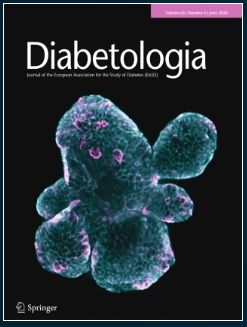The role of SLC19A2 variants in the wide spectrum of non-autoimmune abnormalities of glucose homeostasis.
IF 10.2
1区 医学
Q1 ENDOCRINOLOGY & METABOLISM
引用次数: 0
Abstract
AIMS/HYPOTHESIS Biallelic pathogenic variants in SLC19A2 (the solute carrier family 19 member 2, which encodes thiamine transporter 1, responsible for thiamine intake) cause a recessive syndromic diabetes of infancy or early childhood in the context of thiamine-responsive megaloblastic anaemia, characterised by sensorineural deafness. Indeed, it has been reported, although only once, that even a heterozygous missense loss-of-function variant of SLC19A2 causes dominantly inherited non-syndromic diabetes. Finally, it is unknown whether rare SLC19A2 pathogenic variants modulate the risk of type 2 diabetes at the population level. We investigated the role of SLC19A2 heterozygous variants in both autosomal dominant mild hyperglycaemia and type 2 diabetes. METHODS We performed whole exome sequencing in two probands with mild hyperglycaemia and in 191,140 samples from the UK Biobank. RESULTS Here we report two different heterozygous missense likely pathogenic variants of SLC19A2 (NM_006996.2) associated with non-syndromic mild hyperglycaemia in two pedigrees (c.515G>T and c.1063A>C missense variants, respectively), clearly confirming the only report available so far suggesting this link. In both pedigrees, individuals who carried an additional variant in one of the established monogenic diabetes genes (i.e. PDX1, NM_000209.3 and KCNJ11, NM_000525.3) showed an anticipation of disease onset of 25-31 years. Finally, 12 rare null variants in SLC19A2 were associated with type 2 diabetes (p=0.00033; OR 3.7; 95% CI 1.3, 227) and increased HbA1c levels (p=0.019, effect [π]=2.2 ± 0.92) in the UK Biobank. CONCLUSIONS/INTERPRETATION Taken together with previous evidence, these data indicate that SLC19A2 variability modulates glucose homeostasis, from recessive syndromic diabetes, to autosomal dominant mild hyperglycaemia, to type 2 diabetes.SLC19A2变异在广泛的非自身免疫性葡萄糖稳态异常中的作用
SLC19A2(溶质载体家族19成员2,编码硫胺素转运蛋白1,负责硫胺素摄入)的双等位致病变异导致婴儿期或幼儿期隐性综合征型糖尿病,伴有硫胺素反应性巨幼细胞贫血,其特征为感音神经性耳聋。事实上,虽然只有一次报道,但即使是SLC19A2的杂合错义功能丧失变异也会导致显性遗传性非综合征型糖尿病。最后,尚不清楚罕见的SLC19A2致病变异是否在人群水平上调节2型糖尿病的风险。我们研究了SLC19A2杂合变异体在常染色体显性轻度高血糖和2型糖尿病中的作用。方法:我们对来自UK Biobank的191,140例轻度高血糖患者和2例先显子进行了全外显子组测序。结果本研究报告了两个家系中与非综合征性轻度高血糖相关的SLC19A2 (NM_006996.2)的两种不同杂合错义可能致病变异(分别为C . 515g >T和C . 1063a >C错义变异),清楚地证实了迄今为止唯一的报告表明这种联系。在这两个家系中,携带一种已知单基因糖尿病基因变体(即PDX1, NM_000209.3和KCNJ11, NM_000525.3)的个体显示出25-31岁的发病预期。最后,SLC19A2中有12个罕见的零变异与2型糖尿病相关(p=0.00033;或3.7;95% CI 1.3, 227)和HbA1c水平升高(p=0.019,效应[π]=2.2±0.92)。结论/解释:结合先前的证据,这些数据表明SLC19A2变异性调节葡萄糖稳态,从隐性综合征型糖尿病到常染色体显性轻度高血糖,再到2型糖尿病。
本文章由计算机程序翻译,如有差异,请以英文原文为准。
求助全文
约1分钟内获得全文
求助全文
来源期刊

Diabetologia
医学-内分泌学与代谢
CiteScore
18.10
自引率
2.40%
发文量
193
审稿时长
1 months
期刊介绍:
Diabetologia, the authoritative journal dedicated to diabetes research, holds high visibility through society membership, libraries, and social media. As the official journal of the European Association for the Study of Diabetes, it is ranked in the top quartile of the 2019 JCR Impact Factors in the Endocrinology & Metabolism category. The journal boasts dedicated and expert editorial teams committed to supporting authors throughout the peer review process.
 求助内容:
求助内容: 应助结果提醒方式:
应助结果提醒方式:


